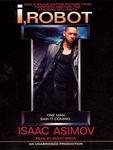
 The Minority Report and Other Stories
The Minority Report and Other Stories
By Philip K. Dick; Read by Keir Dullea
4 Cassettes – 6 Hours [UNABRIDGED]
Publisher: Harper Audio
Published: 2001
ISBN: 0694523348
Themes: Science Fiction / Future Knowledge / Time Travel / Paranoia / Robots / Artificial Intelligence / Alien Invasion /
This collection of five Philip K. Dick tales includes stories that will make you laugh, cringe in fear, and most of all… think. Stories included:
The Minority Report
The creator and head of Pre-crime, John Anderton, runs a special branch of the police that uses precognition to lock-up those who plan to commit felonies. When he suddenly finds that his own name is on the list of future-murderers to be rounded up he thinks it’s a conspiracy to dismantle the system. After all, why would he, a respected crime fighter, kill a man he’s never met? His only chance is to escape, find out who this man he’s supposed to kill is. First published in the pulp magazine “Fantastic Universe” in January 1956, “The Minority Report” is an intriguing look at the philosophical consequences of thinking about the future and free will. If we can see into the future then the future is like a book in which we are all characters, and which we have no ability to chose to do anything. But if we can find out what a person’s future behavior is – and can prevent it – how reliable was the view of that future? Aren’t the two mutually exclusive? Isn’t future knowledge an irresolvable paradox? Like nearly every Dick tale, this one is extremely engaging. Unlike the movie adaptation, our hero isn’t a dashing Tom Cruise type, instead as the first line of the story illustrates: “The first thought Anderton had when he saw the young man was ‘I’m getting bald. Bald and fat and old.” Anderton is a protagonist lacking self-confidence. That weakness and the mounting paranoia enhance the tale all the more.
We Can Remember It For You Wholesale
Quail is just a working schlub, too poor to afford a trip to Mars, a place he’s always dreamed about going. His frustration leads him to buy a memory implant, one that will give him an ersatz visit to the red planet, and it’s said to be one so real that if he can find proof that he didn’t actually go, he can get his money back! But when something goes wrong during the procedure Quail starts to remember the truth – he’s actually been to Mars already! “We Can Remember It For You Wholesale” was the basis of the feature film Total Recall, starring Arnold Schwarzenegger, and for the first three-quarters of the story, the plots are very similar. But fear not! As is becoming the rule in Hollywood, the ending is different. And I happen to think Dick’s version is even better. Originally published in Fantasy and Science Fiction Magazine’s April 1966 issue, this one is one you definitely won’t forget.
Paycheck
Recently adapted into an action film directed by John Woo and starring Ben Affleck, “Paycheck” is the tale of an engineer who works under a strange contract. As a condition of his employment he must have his memories of his work wiped. After doing the job, two years have passed, and of course he has no memory of the previous two years – in lieu of wages he’s apparently traded in a large cash payment for a bag of seemingly worthless and unrelated objects. When the security police of the totalitarian state he lives in arrests him and demands to know what he’s been working on for the past two years he suddenly discovers that the “worthless objects” are helping him escape! Can this collection of junk actually unlock the secret of his recent past – and insure that he has a future? First published in “Imagination” Magazine’s June 1953 issue, “Paycheck” is as slippery and mysterious as it is slick written and inevitable – Dick is the ultimate idea man.
Second Variety
Under a flag of truce, the UN officer receives an offer of parlay from a lone Russian Soldier. He’s to travel alone to a rendezvous behind enemy lines to discuss a matter of ‘mutual interest’. “Second Variety” is the basis of the obscure SF film Screamers, starring Peter Weller. This novella originally appeared in Space Science Fiction magazine’s May 1953 issue and offers a glimpse at horrifically scarred future Earth where a nuclear winter and two opposing armies are confronted by an even more dangerous weapon than ICBMs. Well written and thoughtful, another masterpiece of paranoia and philosophy. Dick can do no wrong!
The Eyes Have It
This short storylet is a rare humour piece that posits the dire consequences literalism and paranoia. Whimsical and truly laugh-out-loud funny it was first published in “Science Fiction Stories 1” in 1953.
Keir Dullea, the reader of all these stories is probably best known as astronaut Dave Bowman in Stanley Kubrick’s film 2001: A Space Odyssey. In recent years Dullea has gained a name for himself as an audiobook narrator, and this collection can only add to that fame. Dullea does accents, and voice changes, but never gets in the way of the wonderful ideas. Well done.
Harper Audio did an excellent job with this collection. Recording quality is top notch and they’ve even accented the reading with little musical cues to let you know when a story has ended or the tape is ready to be flipped. Other than the uninteresting cover art and the flimsy packaging, which is unfortunately, all too standard these days, my only complaint was that they didn’t do more of Philip K. Dick’s stories. I wan’t more! More!!!!!!!!!!!!!
Posted by Jesse Willis




 Bernardo’s House
Bernardo’s House